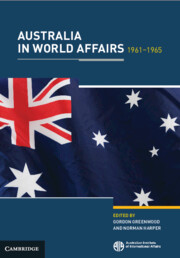Book contents
- Frontmatter
- Preface
- Contents and Contributors
- I Australian Foreign Policy in Action
- II The Australian Diplomatic Service 1935–1965
- III Economic Policies
- IV The United Nations
- V Australian Defence, 1945–1965
- VI Australia and the United States
- VII Australia and Japan, 1961–1965
- VIII Australian Policy Towards China, 1961–1965
- IX Australia and the Indian Ocean Area, 1961–1965
- X Papua-New Guinea, 1961–1965
- XI The South Pacific Commission
- Index
- Plates
IX - Australia and the Indian Ocean Area, 1961–1965
Published online by Cambridge University Press: 29 March 2024
- Frontmatter
- Preface
- Contents and Contributors
- I Australian Foreign Policy in Action
- II The Australian Diplomatic Service 1935–1965
- III Economic Policies
- IV The United Nations
- V Australian Defence, 1945–1965
- VI Australia and the United States
- VII Australia and Japan, 1961–1965
- VIII Australian Policy Towards China, 1961–1965
- IX Australia and the Indian Ocean Area, 1961–1965
- X Papua-New Guinea, 1961–1965
- XI The South Pacific Commission
- Index
- Plates
Summary
The Indian Ocean area does not constitute an obvious natural region, and the states around it cannot be said to form an international subsystem, although the sea’s function as a line of communication has led to connections between countries which might not otherwise have known much of each other. The east coast of Africa, for example, has had a substantial Indian population throughout this century because of the ease of access from Indian ports and the protection which was available to Indians under British rule. Colombo was an obvious stopping-place for liners from Australia to Britain. But, in the main, the ocean is too broad to have encouraged close connections between the countries around its rim. The area exists as an entity only on the map. Strategists can draw lines on it, and plot the sites of possible bases which depend for their utility upon a supposed community of interests between the countries which border the ocean, but in fact the only unity which the area has possessed historically has been in the relatively brief period when Britain was the dominant power in Egypt, East Africa, South Africa, India, Burma, the Malay peninsula and Australia. That period is now over.
Keywords
- Type
- Chapter
- Information
- Australia in World Affairs 1961–1965 , pp. 416 - 443Publisher: Cambridge University PressFirst published in: 2024

